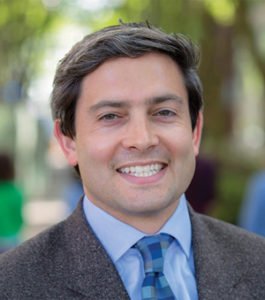 CHAPEL HILL (May 13, 2018) – On a day normally considered joyous, alumnus Rye Barcott offered some advice based in reality for UNC Chapel Hill graduates who will ultimately confront adversity:
CHAPEL HILL (May 13, 2018) – On a day normally considered joyous, alumnus Rye Barcott offered some advice based in reality for UNC Chapel Hill graduates who will ultimately confront adversity:
Take the pain.
Barcott, a 2001 Carolina alum, Marine Corps veteran in Bosnia and Iraq, social entrepreneur and Higher Education Works board member, told the graduates and their families gathered at Kenan Stadium that they will each experience challenges.
He referred to the movie Platoon, where a sergeant in fear for his entire unit’s safety covers the mouth of a severely wounded, screaming soldier and tells him, “Take the pain.”
“The challenge is pain is inevitable, and it does not go away if you run from it. In fact, counter-intuitively, it often gets worse. Sometimes the best way to take pain out of the world is to confront it head on,” Barcott said.
“So the question I want to focus this address on is: how best to take the pain, and at the same time create something useful, something positive, out of it?”
The answer, he said, has three parts: Attitude, service and perspective. And he shared a story about attitude he experienced in Kenya.
“One of the most painful moments of my life led me to social entrepreneurship. I was 21 and half-way around the world. I curled in the fetal position. My stomach heaved. I wondered if whatever was inside my body might kill me. I was freezing yet sweating.
“Then a nurse named Tabitha came to see me….Tabitha took one look at me and diagnosed malaria.
“Tabitha handed me some traditional medication. She said I would be okay if I rest and ‘think positive.’ Tabitha’s words and the medication helped. I changed my attitude, began to think positively, and started to control the pain more than it controlled me.”
Back at UNC for his senior year, Barcott couldn’t get the impoverished Kibera slum in Nairobi off his mind. He started an organization called Carolina for Kibera to help children there and returned to Kenya.
“Tabitha found me and led me to her 10-by-10,” he said. “But this time she had two 10-by-10s. The second one was a clinic. It became part of our organization…
“Due to circumstances beyond her control, pain was an unavoidable and ever-present part of Tabitha’s life. Yet she kept a positive, can-do attitude. And what a difference attitude makes.
“Today, the Tabitha Clinic treats more than 15,000 patients per year. It is part of Carolina for Kibera, which now, 17 years later, is the anchor of the largest public health partnership with the U.S. CDC in a slum community…. we save lives in Kibera from deadly diseases like malaria.
“That’s a story about attitude. Attitude is everything. Pick a good one.”
Barcott also spoke of a fellow soldier – Sergeant Dave – who managed to serve abroad on dangerous missions even after learning his newborn son back home had a hole in his heart.
“How did he do it under such duress? Sergeant Dave explained to me that he decided his son’s condition was out of his control while he deployed. The best thing he could do was to immerse himself in his service and be optimistic because that helped him, his family, and everybody around him.
“That’s the wonderful secret about service. Helping others helps you. You think less about your own pain and can make more of a positive impact on others,” Barcott said.
“Our beloved university helped open our eyes to the world. Keep this perspective. Nurture it,” he said. “It can help you better take the pain and create something useful, maybe even something transcendent, out of it.”
Barcott thanked the mothers in the audience on Mother’s Day.
Then he explained how the Tar Heel nickname was derived from North Carolina soldiers who were so tenacious in battle that they were said to have tar on their heels.
“So, graduates, Tar Heels, my hope for you – and for us – is that you don’t run from the pain. Maneuver around the stuff that you can, the pain that’s unnecessary,” he said.
“For the pain that’s part of life and certainly the pain that’s part of making a difference, KEEP THE TAR ON YOUR HEELS!
CHANCELLOR CAROL FOLTrecounted how the 5,000 graduates have seen much in their years at Carolina: The Ice Bucket Challenge to raise money to fight ALS, protests over HB2 and Confederate monuments, UNC professor Aziz Sancar winning the Nobel Prize, and national championships in six sports.
“Graduates, you earned this moment with your hard work and your determination,” she said.
As they leave Carolina, she said, “Find something you love so much that you can say, ‘I never did a day of work.’”

Leave a Reply